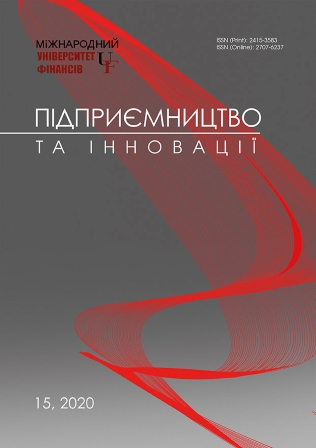ASSESSMENT OF INTELLECTUAL ACTIVITY OF STAFF AS A COMPONENT OF ECONOMIC SECURITY OF THE ENTERPRISE
Abstract
One of the obstacles to ensuring the economic security of the enterprise is to reduce the intellectual activity of staff as a major part of the personnel component of the economic security of the enterprise. The introduction of assessment of intellectual activity of staff is crucial for the economic security of the enterprise. When forming a system of indicators that significantly affect the level of economic security of enterprises from the standpoint of assessing the intellectual activity of staff, to increase the informativeness and significance of the integrated indicator, a large number of diverse input indicators must first be grouped by a certain characteristic, namely: on groups (clusters: qualifications, abilities, opportunities), the level of intellectual activity of the personnel according to the Harrington scale is defined by an expert method. As a result of the assessment, high, acceptable, satisfactory, low, crisis levels are established, which allows to develop recommendations for enterprises on how to achieve acceptable levels of their economic security. The approach to assessing the level of intellectual activity of the personnel of the intellectualization of the enterprise should be individual and the most optimal for the relevant industry and for a particular enterprise. Therefore, due to the diversity and specificity of a single integrated approach to this is not and cannot be. The proposed algorithm should be aimed at, on the one hand, to stimulate the desire of each employee to work effectively, which, in turn, will ensure economic security, and on the other – to minimize threats from the company’s staff. Summing up the above, we conclude that personnel security is beginning to cover areas that were not previously taken into account. Assessment of the level of intellectual activity of staff is one of the safety factors in all areas of the enterprise, neglect of which can not only cause significant damage, but also destroy it. Information on the level of intellectual activity of staff becomes the basis for the development of recommendations for improving the personnel security of the enterprise from the standpoint of its economic security.
References
Иванов Ю.Б. Конкурентоспособность предприятия: оценка, диагностика, стратегия. Харьков : изд. ХНЭУ, 2004. 252 с.
Іщук С.О. Виробничий потенціал промислового підприємства: проблеми формування і розвитку. Львів : ІРДНАН України, 2006. 278 с.
Меламьюка К. Измерение стоимости интеллектуального капитала. URL: http://www.osp.ru/cio/2000/060/28.htm (дата звернення: 23.03.2019).
Мельник Л.Г., Волк О.М., Гайтина Н.М. Удосконалення методів мотивації працівників на підприємствах України з урахуванням міжнародного досвіду. Вісник СумДУ. Серія «Економіка». 2012. № 4. С. 55–63.
Назарова Г.В., Гавкалова Н.В., Маркова Н.М. Формування та розвиток людського капіталу корпоративних підприємств. Харків : вид. ХНЕУ, 2006. 238 с.
Новосад В.П., Селіверстов Р.Г. Методологія експертного оцінювання : конспект лекцій. Київ : НАДУ, 2008. 48 с.
Орлова Т.М. Интеллектуальный капитал: понятие, сущность, виды. Проблемы теории и практики управления. 2008. № 4. С. 109–119.
Остервальдер А., Пинье И. Построение бизнес-моделей: настольная книга стратега и новатора / пер. с англ. М.В. Кульнева. 3-е изд. Москва : Альпина Паблишер ; Сколково : Московская школа упр., 2013. 287 с.
Отенко И.П., Малярец Л.М. Механизм управления потенциалом предприятия. Харьков : Изд. ХГЭУ, 2003. 220 с.
Пономаренко В.С., Тридід О.М., Кизим М.О. Стратегія розвитку підприємства в умовах кризи : монографія. Харків : ІНЖЕК, 2003. 328 с.
Сем’ян О.В. Інтелектуалізація людського капіталу підприємства. Вісник Бердянського університету менеджменту і бізнесу. 2011. № 4 (16). С. 141‒145.
Nyborg P. The Bologna Process from Berlin to Bergen (June). Contribution to Coimbra Group, EPET Task Force, by the Head of the Bologna Follow up Group Secretariat, 2005. URL: http://www.nyborgprivaterealskole.
Ivanov Yu.B. (2004). Konkurentosposobnost predpriyatiya: otsenka, diagnostika, strategiya [Competitiveness of the enterprise: assessment, diagnostics, strategy]. Kh.: izd. KHNEU. 252 р.
Ishchuk S.O. (2006). Vyrobnychyy potentsial promyslovoho pidpryyemstva: problemy formuvannya i rozvytku [Production potential of industrial enterprise: problems of formation and development]. Lviv: IRDNAN Ukrayiny. 278 р.
Melamyuka K. Izmereniye stoimosti intellektualnogo kapitala. [Measuring the Value of Intellectual Capital]. URL: http://www.osp.ru/cio/2000/060/28.htm.
Melnyk L.H., Volk O.M., Haytyna N.M. (2012). Udoskonalennya metodiv motyvatsiyi pratsivnykiv na pidpryyemstvakh Ukrayiny z urakhuvannyam mizhnarodnoho dosvidu. [Improvement of methods of motivation of workers at the enterprises of Ukraine taking into account the international experience]. Visnyk SumDU. Seriya “Ekonomika”, no. 4, pp. 55 63.
Nazarova H.V., Havkalova N.V., Markova N.M. (2006). Formuvannya ta rozvytok lyudsʹkoho kapitalu korporatyvnykh pidpryyemstv. [Formation and development of human capital of corporate enterprises]. Kharkiv: vyd. KHNEU. 238 p.
Novosad V.P., Seliverstov R.H. (2008). Metodolohiya ekspertnoho otsinyuvannya: konspekt lektsiy. [Methodology of expert evaluation: lecture notes]. K.: NADU. 48 p.
Orlova T.M. (2008). Intellektualnyy kapital: ponyatiye, sushchnost’, vidy. [Intellectual capital: concept, essence, types]. Problemy teorii i praktiki upravleniya, no. 4, pp. 109 119.
Ostervalder A., Pinye I. (2013). Postroyeniye biznes-modeley: nastol’naya kniga stratega i novatora [Building business models: handbook of strategist and innovator] / per. s angl. M.V. Kul’neva. 3-ye izd. M.: Al’pina Pablisher; Skolkovo: Moskovskaya shkola upr. 287 p.
Otenko I.P., Malyarets L.M. (2003). Mekhanizm upravleniya potentsialom predpriyatiya. [Mechanism of enterprise potential management]. Kh.: Izd. KHGEU. 220 р.
Ponomarenko V.S., Trydid O.M., Kyzym M.O. (2003). Stratehiya rozvytku pidpryyemstva v umovakh kryzy: monohrafiya. [Strategy of enterprise development in crisis conditions: monograph]. Kh.: Vydavnychyy Dim INZHEK. 328 р.
Semyan O.V. (2011). Intelektualizatsiya lyudsʹkoho kapitalu pidpryyemstva. [Intellectualization of human capital of the enterprise]. Visnyk Berdyanskoho universytetu menedzhmentu i biznesu, no. 4 (16), pp. 141 145.
Nyborg P. The Bologna Process from Berlin to Bergen (June). Contribution to Coimbra Group, EPET Task Force, by the Head of the Bologna Follow up Group Secretariat, 2005. URL: http://www.nyborgprivaterealskole



